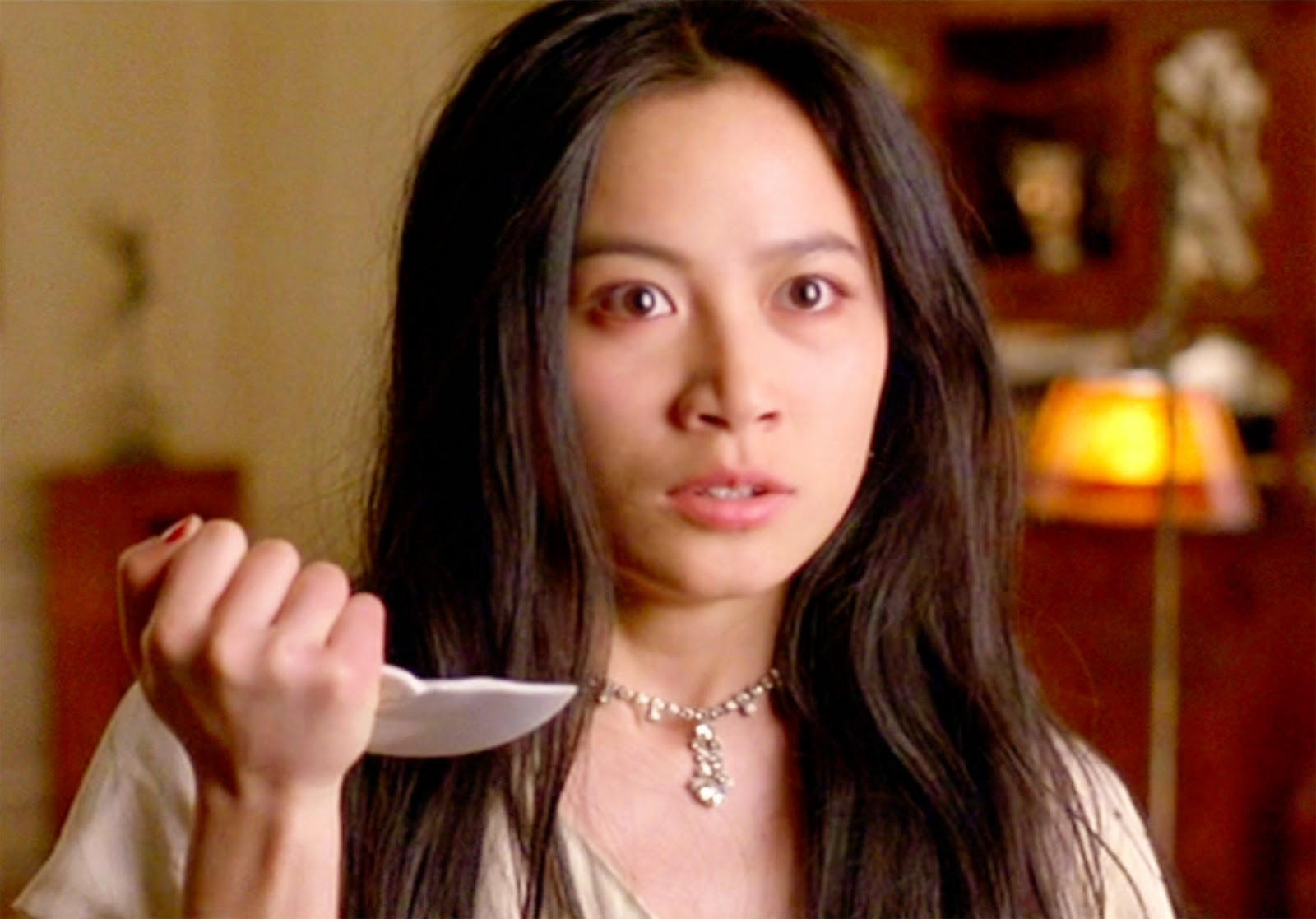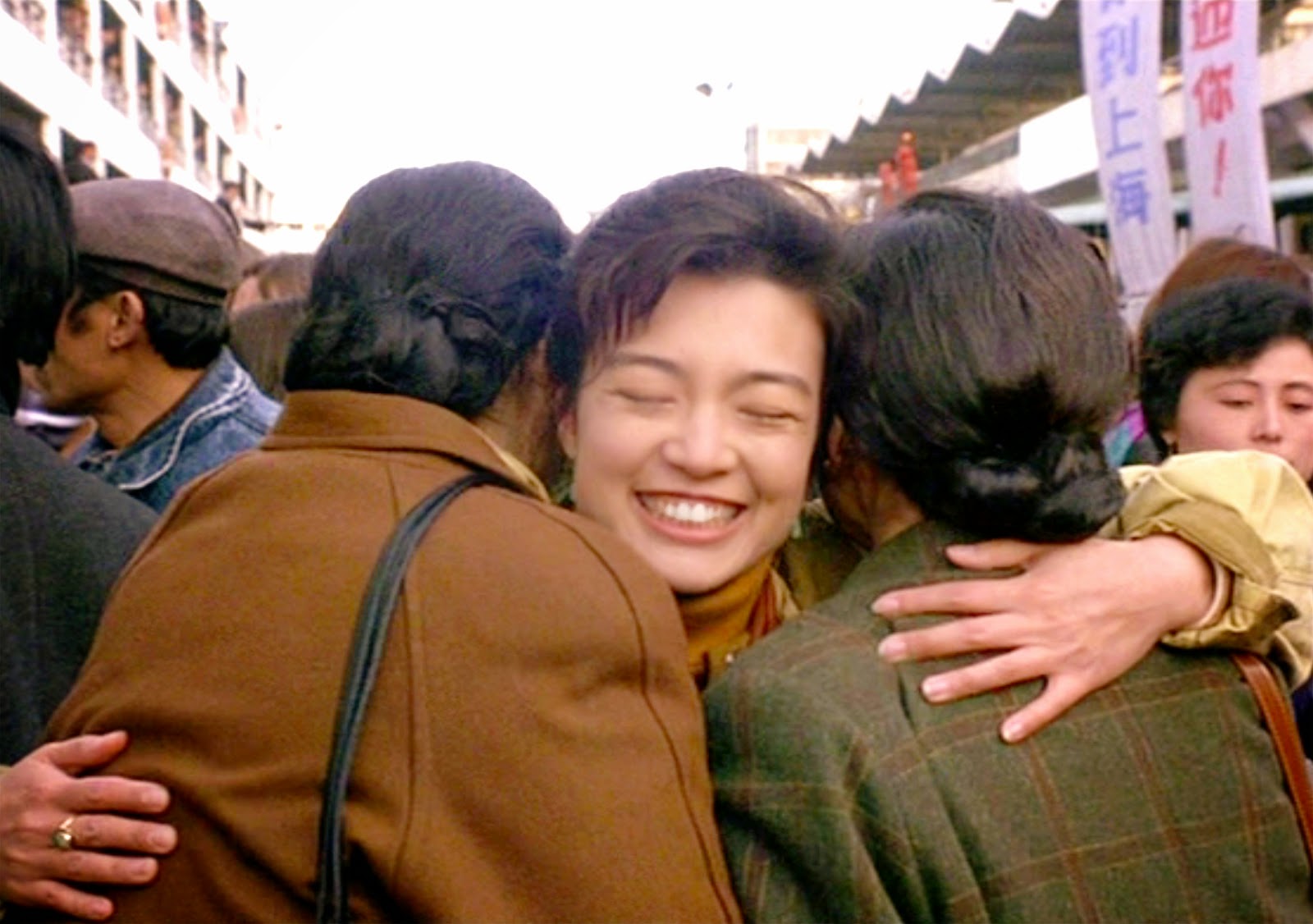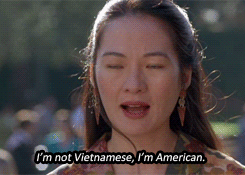The Joy Luck Club
1993
Directed by Wayne Wang
Cast: Ming-Na Wen, Rosalind Chao, Lauren Tom, France Nguyen, Tamlyn Tomita, Lisa Lu, Victor Wong, Andrew McCarthy
Genre: Drama
U.S Box Office Gross: over $32 million
Plot: The life stories of four Asian women and their daughters reflect and guide each other
'The Emotional Trials And Tribulations Of What It Is To Be Chinese/Asian - American & As A Woman'
Amy Tan's 1989 best-selling novel, The Joy Luck Club was turned into a feature-length movie produced by Oliver Stone, acclaimed for hits such as Platoon, JFK and the controversial Natural Born Killers of 1994, with the screenplay by Ronald Bass of Sleeping With The Enemy & Dangerous Minds fame and was directed by Wayne Wang. Released in 1993, Tan's novel gives the reader a glimpse of some of the cultural experiences, dynamics, joys and difficulties Asian- Americans experience, centred around 4 Chinese women who'd experienced fear, tragedy and loss, as well as making sacrifices in order to build new lives for themselves and for their daughters, who were born and raised in the United States.
The narrative is told in flashback of their tragic tales, recounting the stories of their lives in China and San Francisco, of the hardships and emotional difficulties that came with it, and how they overcame them and moved on from that.
We have a situation where the mothers are very traditional and having being born in a traditional Chinese culture, they believe their way is the right way and the only way - whereas their American born daughters are more used to the Western culture. This generation gap presents many issues, such as the mothers who are against the idea of interracial dating and marriage and that they want their children to be married to a person of the same race as them. We have a mother putting pressure on the eldest daughter to be something that she's not and the struggles of breaking away from the expectations placed on her. Daughter Rose is married to a White man (played by Andrew McCarthy) with a racist mother, and he for one stood up to her.
In one scene, Ming- Na Wen's character as a young girl is watching TV and her mother enters her room and tells her it's time for piano practice. She refuses to abide by her orders and says to her, ''This isn't China''. In the next scene, her mother when she was in China abandons her babies - due to the so-called one-child policy rule. Thankfully years later, we find out those same babies grew up and they turned out to be okay.
In another tale, a mother An-Mei Hsu, whose own mother was raped and became a concubine and Lena has a controlling husband, Harold. And lastly, of a mother who died by suicide after eating opium filled dumplings. She whispered she'd rather kill herself in order to give her daughter a stronger spirit.
I am going to get the negative aspects out of the way, first and foremost: the first being the main casting. When one looks at it, it's not that big of a deal, but the thing is not all the actresses are of Chinese descent. Only Ming-Na Wen currently of Marvel: Agents of Shield and formerly of the medical hit drama, E.R is appropriately cast, as is Lauren Tom who appeared in 1990's Cadillac Man and later voiced Amy in the Matt Groening animated series, Futurama and Rosalind Chao. The rest of the female cast is down to colourblind casting: we have a Japanese - American actress in Tamlyn Tomita playing one of the other 4 daughters and another Japanese actress playing one of the mothers. If the film is attempting to portray an individual or individuals of a particular race or ethnicity, there needs to be consistency across the board. Movies featuring predominately White casts have no issues with this, but Asian and Asian- American movies that deal specifically with or make the mistake with one race or be it Chinese actor playing a Japanese character and vice-versa, is quite frankly annoying to see.
Another problem with The Joy Luck Club is the negative depictions of the male characters that some will find stereotypical, although thankfully, the White husband was finally accepted by the mother in the end. There are also notable appearances from Andrew McCarthy (Mannequin) and Victor Wong (Big Trouble in Little China) in this movie.
Also, a lot of people have said that the film, as well as the book, features negative stereotypes and reinforces them, but in the context of this movie, it made sense because these types of things happen in our culture. As awful as they are. Both the book and movie's moderate success at the theaters in America had a huge impact on Asian- Americans and the way they are perceived by the rest of society as it brought more visibility.
In watching The Joy Luck Club movie, I can relate to the issues and themes that were told throughout, because people like myself have had problems and falling out with family members, due to generation gaps, cultural differences. language barriers, immigration, Asian vs Asian -American/British, trans-cultural dynamics. This is the side of movie-making mainstream Hollywood doesn't want the general audience to see when it comes to Asian- American portrayals and tales.
I'm not Asian American: I'm a Chinese Briton and yet I can still relate to and resonate with those particular issues. These cultural issues are not just things Asian- Americans endure themselves, but by Asian Canadians, Asian Australians and British Asians who experience the exact same thing. And with regards to the stories in general, they are universal to everyone and anyone.
With excellent performances all-round from every cast member, despite the one-note portrayals of the male characters, the film moves at a good pace and the narrative is presented well. The female characterisations convey a range of emotions from happiness to anger and sadness. Wayne Wang's sweeping-yet slick direction, coupled with Ronald Bass and Amy Tan's screenplay, makes The Joy Luck Club an intimate look at what it means to be a traditional Asian, as well as Asian- American. Some of the tales are harrowing to see, but they really highlight the issues and things that occur within Asian American and Chinese culture.
The gathering of these women, along with the men, reflect how far they have come in their lives and from the difficulties and struggles they had to undergo.
Final Verdict:
The Joy Luck Club is a vignette of tales of inter-generational mother-daughter relationships, which become all the more complex by their dual Chinese-American identity and in bridging the gap between the older generation and younger/next generation.
This movie is anything but a 'chick flick': it could have turned into one massive schmaltz-fest, but the overriding themes, issues, story-lines, even in the Chinese American context have such universal appeal and reverence that makes this movie worth seeing, as well as discussing.
If the 1980s belonged to Big Trouble in Little China when it came to Chinese-American cinematic representation, then the 1990s typified this exact notion but through Wayne Wang's The Joy Luck Club. Both movies are very different -one is fantasy action comedy, the other is a drama; one features usage of the Cantonese dialect, the other Mandarin, but the one thing they share in common is that their takes on the Asian-American experience and of Chinese American culture are unique and frank.
The Joy Luck Club is at times powerful, moving, poignant and an emotionally - charged film that goes to lengths and beyond to decipher what it means to be American, or a good human being.... no matter what your race.
*score last updated: 26 May, 2017
Overall:

1993
Directed by Wayne Wang
Cast: Ming-Na Wen, Rosalind Chao, Lauren Tom, France Nguyen, Tamlyn Tomita, Lisa Lu, Victor Wong, Andrew McCarthy
Genre: Drama
U.S Box Office Gross: over $32 million
Plot: The life stories of four Asian women and their daughters reflect and guide each other
'The Emotional Trials And Tribulations Of What It Is To Be Chinese/Asian - American & As A Woman'
Amy Tan's 1989 best-selling novel, The Joy Luck Club was turned into a feature-length movie produced by Oliver Stone, acclaimed for hits such as Platoon, JFK and the controversial Natural Born Killers of 1994, with the screenplay by Ronald Bass of Sleeping With The Enemy & Dangerous Minds fame and was directed by Wayne Wang. Released in 1993, Tan's novel gives the reader a glimpse of some of the cultural experiences, dynamics, joys and difficulties Asian- Americans experience, centred around 4 Chinese women who'd experienced fear, tragedy and loss, as well as making sacrifices in order to build new lives for themselves and for their daughters, who were born and raised in the United States.
The narrative is told in flashback of their tragic tales, recounting the stories of their lives in China and San Francisco, of the hardships and emotional difficulties that came with it, and how they overcame them and moved on from that.
We have a situation where the mothers are very traditional and having being born in a traditional Chinese culture, they believe their way is the right way and the only way - whereas their American born daughters are more used to the Western culture. This generation gap presents many issues, such as the mothers who are against the idea of interracial dating and marriage and that they want their children to be married to a person of the same race as them. We have a mother putting pressure on the eldest daughter to be something that she's not and the struggles of breaking away from the expectations placed on her. Daughter Rose is married to a White man (played by Andrew McCarthy) with a racist mother, and he for one stood up to her.
In one scene, Ming- Na Wen's character as a young girl is watching TV and her mother enters her room and tells her it's time for piano practice. She refuses to abide by her orders and says to her, ''This isn't China''. In the next scene, her mother when she was in China abandons her babies - due to the so-called one-child policy rule. Thankfully years later, we find out those same babies grew up and they turned out to be okay.
In another tale, a mother An-Mei Hsu, whose own mother was raped and became a concubine and Lena has a controlling husband, Harold. And lastly, of a mother who died by suicide after eating opium filled dumplings. She whispered she'd rather kill herself in order to give her daughter a stronger spirit.
I am going to get the negative aspects out of the way, first and foremost: the first being the main casting. When one looks at it, it's not that big of a deal, but the thing is not all the actresses are of Chinese descent. Only Ming-Na Wen currently of Marvel: Agents of Shield and formerly of the medical hit drama, E.R is appropriately cast, as is Lauren Tom who appeared in 1990's Cadillac Man and later voiced Amy in the Matt Groening animated series, Futurama and Rosalind Chao. The rest of the female cast is down to colourblind casting: we have a Japanese - American actress in Tamlyn Tomita playing one of the other 4 daughters and another Japanese actress playing one of the mothers. If the film is attempting to portray an individual or individuals of a particular race or ethnicity, there needs to be consistency across the board. Movies featuring predominately White casts have no issues with this, but Asian and Asian- American movies that deal specifically with or make the mistake with one race or be it Chinese actor playing a Japanese character and vice-versa, is quite frankly annoying to see.
Another problem with The Joy Luck Club is the negative depictions of the male characters that some will find stereotypical, although thankfully, the White husband was finally accepted by the mother in the end. There are also notable appearances from Andrew McCarthy (Mannequin) and Victor Wong (Big Trouble in Little China) in this movie.
Also, a lot of people have said that the film, as well as the book, features negative stereotypes and reinforces them, but in the context of this movie, it made sense because these types of things happen in our culture. As awful as they are. Both the book and movie's moderate success at the theaters in America had a huge impact on Asian- Americans and the way they are perceived by the rest of society as it brought more visibility.
In watching The Joy Luck Club movie, I can relate to the issues and themes that were told throughout, because people like myself have had problems and falling out with family members, due to generation gaps, cultural differences. language barriers, immigration, Asian vs Asian -American/British, trans-cultural dynamics. This is the side of movie-making mainstream Hollywood doesn't want the general audience to see when it comes to Asian- American portrayals and tales.
I'm not Asian American: I'm a Chinese Briton and yet I can still relate to and resonate with those particular issues. These cultural issues are not just things Asian- Americans endure themselves, but by Asian Canadians, Asian Australians and British Asians who experience the exact same thing. And with regards to the stories in general, they are universal to everyone and anyone.
With excellent performances all-round from every cast member, despite the one-note portrayals of the male characters, the film moves at a good pace and the narrative is presented well. The female characterisations convey a range of emotions from happiness to anger and sadness. Wayne Wang's sweeping-yet slick direction, coupled with Ronald Bass and Amy Tan's screenplay, makes The Joy Luck Club an intimate look at what it means to be a traditional Asian, as well as Asian- American. Some of the tales are harrowing to see, but they really highlight the issues and things that occur within Asian American and Chinese culture.
The gathering of these women, along with the men, reflect how far they have come in their lives and from the difficulties and struggles they had to undergo.
Final Verdict:
The Joy Luck Club is a vignette of tales of inter-generational mother-daughter relationships, which become all the more complex by their dual Chinese-American identity and in bridging the gap between the older generation and younger/next generation.
This movie is anything but a 'chick flick': it could have turned into one massive schmaltz-fest, but the overriding themes, issues, story-lines, even in the Chinese American context have such universal appeal and reverence that makes this movie worth seeing, as well as discussing.
If the 1980s belonged to Big Trouble in Little China when it came to Chinese-American cinematic representation, then the 1990s typified this exact notion but through Wayne Wang's The Joy Luck Club. Both movies are very different -one is fantasy action comedy, the other is a drama; one features usage of the Cantonese dialect, the other Mandarin, but the one thing they share in common is that their takes on the Asian-American experience and of Chinese American culture are unique and frank.
The Joy Luck Club is at times powerful, moving, poignant and an emotionally - charged film that goes to lengths and beyond to decipher what it means to be American, or a good human being.... no matter what your race.
*score last updated: 26 May, 2017
Overall:






No comments:
Post a Comment